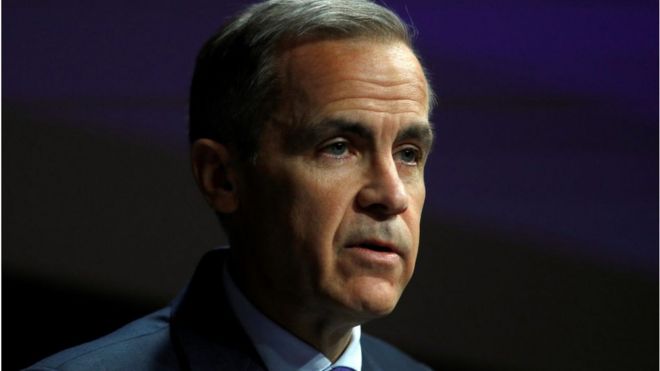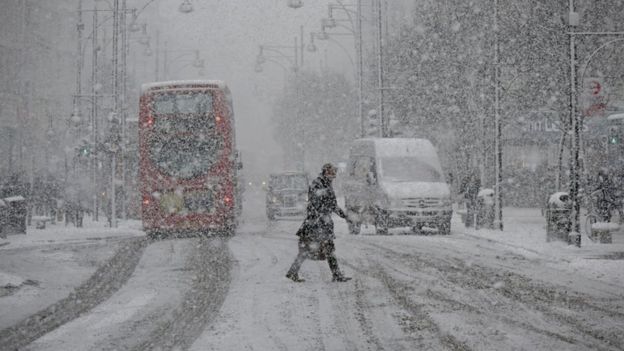
The Bank of England governor has said a "disorderly" Brexit could delay rises in interest rates as the Bank would be obliged to act to shore up the economy.
Mark Carney made clear what he described as a "sharp Brexit" could mean a reassessment of whether an interest rate rise is imminent.
And whatever progress is made towards the "new trading arrangements" with the EU, weaker income growth "is likely to accompany that adjustment".
He was speaking at a London conference.
Mr Carney said that the negotiations were entering a "critical phase" and the Bank was prepared in case the transition was not "smooth".
He said the Bank was "ready for Brexit whatever form it takes" and suggested that it might be willing to tolerate higher inflation and retain ultra-low interest rates to support growth and jobs.
The Governor also said that weak growth in the first three months of the year may not just be down to the harsh weather.
 JEFF OVERS/BBC
JEFF OVERS/BBC
Consumer spending statistics were weaker and the housing market was also showing signs of decline, the Governor argued.
Many economists believe a weaker economy would also be likely to head off any plans to increase interest rates.
The governor also re-iterated the Bank's analysis that the referendum result had damaged the economy.
People's incomes had been squeezed and spending had been cut back, he said, leaving households 4% worse off than the Bank expected before the referendum.
Businesses were also investing less than expected.
Inflation
"As the consequences of sterling's fall showed up in the shops and squeezed their real incomes, [consumers] have cut back spending growth to rates about one half of those pre-referendum," he said.
Mr Carney argued the fall in the value of sterling happened because "financial markets are valuing today what they expect tomorrow: a relative fall in real incomes as the UK moves toward its new trading arrangements".
"Inflation rose well above the 2% target, peaking at 3.1% late last year, an overshoot entirely due to the referendum-induced fall in the exchange rate."
His speech comes two days after telling the Treasury Select Committee that households were £900 a year worse off due to the referendum.
Those comments brought a sharp response from the Foreign Secretary, Boris Johnson, who said that it was "absolutely not the case that Brexit has damaged the interests of this country".
'Different path'
Mr Carney made clear that the Bank was preparing for all eventualities.
"A sharper Brexit could put monetary policy on a different path," the Governor said.
"For example, if the transition were disorderly, or the end state agreement materially worse than the average potential outcome, then the MPC [the Monetary Policy Committee, which sets interest rates] could once again be confronted by a trade-off between the speed with which it returns inflation to target and the support policy provides to jobs and activity.
"On this path, the MPC can be expected to set policy to manage any trade-off using the framework it applied following the referendum."
After the referendum result the Bank cut interest rates and increased the amount of financial stimulus it provided to businesses.
Senior sources have made clear that while interest rates cuts are not at present on the agenda, the speed with which any interest rate rises are brought in could be slowed if the negotiations with the EU do not progress as hoped.
The same sources also said that the Bank was ready for any eventuality and did not believe that a "sharp Brexit" was the most likely outcome.
Progress via an implementation period was still probable and if it was agreed that could lead to a sharp pick up business confidence, for example.
Mr Carney said: "The MPC has repeatedly emphasised that monetary policy cannot prevent either the necessary real adjustment as the UK moves to its new trading arrangements or the weaker real income growth likely to accompany that adjustment."
No comments:
Post a Comment